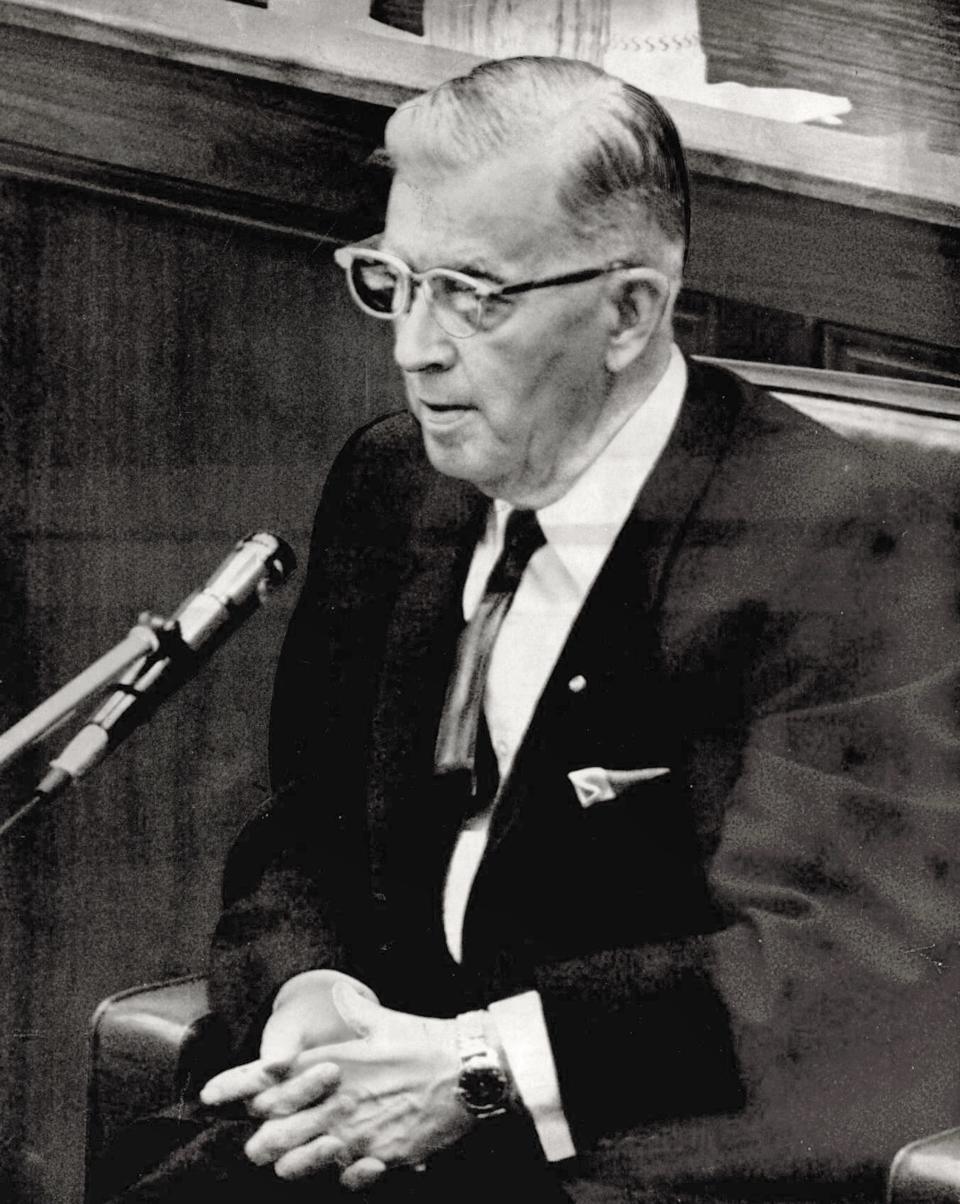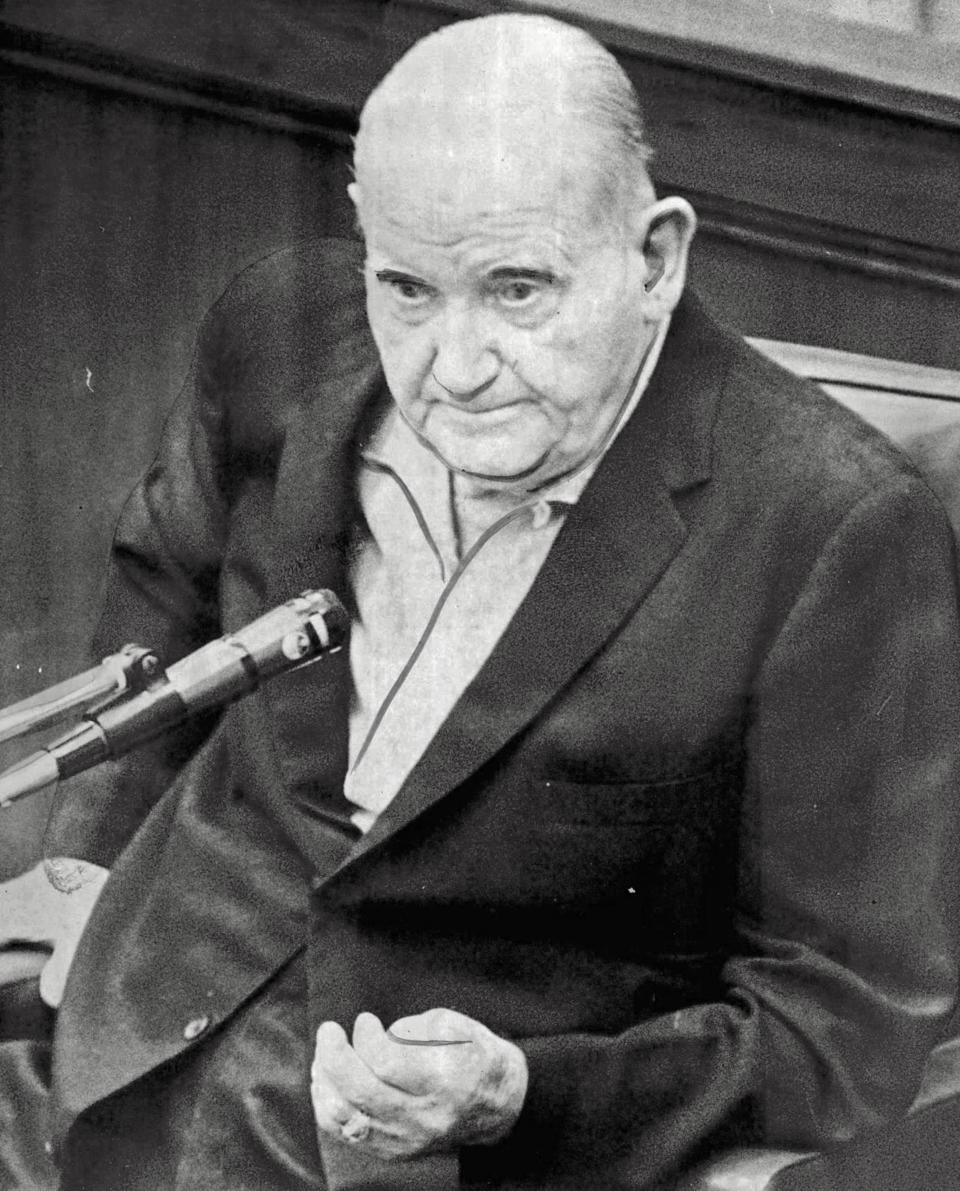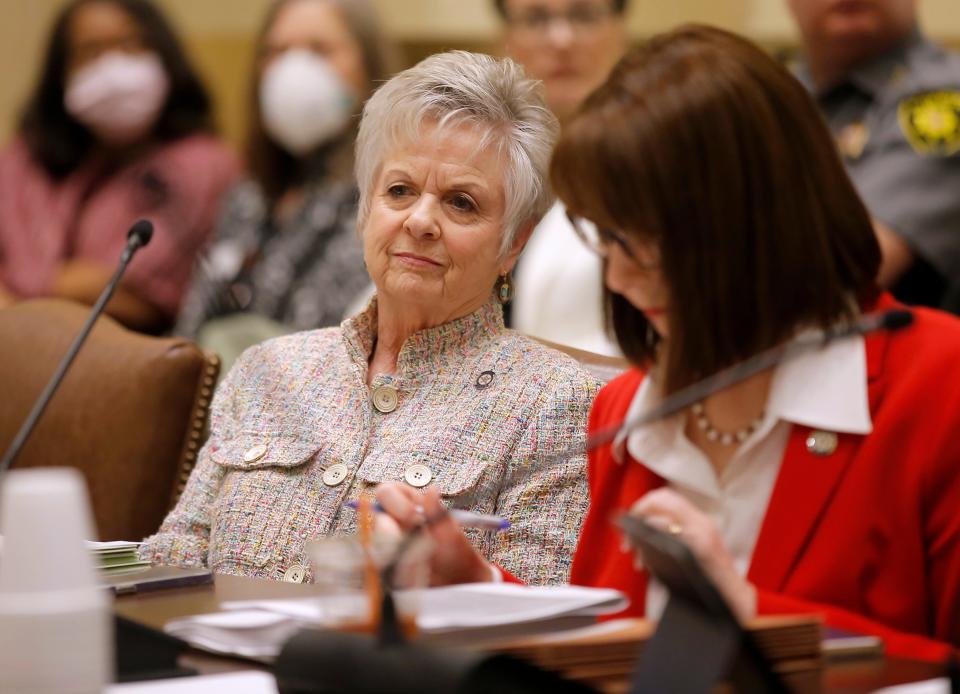Analysis: Right-wing groups, Catholic Church are behind effort to change how Oklahoma judges are appointed
A right-wing think tank, a national conservative advocacy group and the Catholic Church in Oklahoma are behind the latest effort to change how state appellate judges and justices are appointed, The Oklahoman has learned.
Documents show the Oklahoma Council of Public Affairs, a right-wing think tank; the Judicial Crisis Network, a national conservative advocacy group; and the Catholic Church, through its arm, the Catholic Conference of Oklahoma, are working with several Republican lawmakers to eliminate the Judicial Nominating Commission and replace it with a process that parallels the federal system.
The federal system in Oklahoma would involve the governor nominating judges subject to Senate confirmation. The goal: Put more "conservative Republican" judges on the bench.
The effort is the latest attempt in a decade-long battle to rid the state of the Judicial Nominating Commission and move to a system that opponents say isn't about the rule of law but instead about finding judges who will pass a conservative litmus test. That test includes arguments about abortion, anti-LGBTQ+ legislation, public funding for religious schools and other issues.
This year, several pieces of legislation were filed that would dramatically change the way appellate judges and justices are appointed and would impose age and tenure limits on those justices.
Commission created after a bribery scandal in the Oklahoma Supreme Court
Oklahoma's Judicial Nominating Commission was created in 1967. The 15-member commission was designed to take the politics out of Oklahoma’s judicial appointment process. State lawmakers moved to the commission system after a scandal rocked the Oklahoma Supreme Court in 1965. That event damaged the court’s reputation and the public's trust in the state's judiciary. It also saw three justices of the Oklahoma Supreme Court end up in prison for bribery.

After the scandal, voters narrowly created the commission, which supporters say has worked well for decades.
The process is simple. The commission takes applications for judicial posts, reviews the applicants, vets their information and recommends the top three candidates to the governor, who makes the final appointment. The applicant chosen by the governor assumes the post immediately and isn’t required to be confirmed by the Oklahoma Senate.
The commission has 15 members. Nine of those are non-lawyers, a posting on the commission's website notes, adding that "these nine cannot be admitted to practice law in Oklahoma or have an immediate family member who has been admitted to practice law in any state."
In addition, the governor appoints six of the non-lawyer commissioners, one from each of the six congressional districts that existed in 1967. Each of those commissioners serve staggered six-year terms, and no more than three of those appointees can belong to any one political party. The three remaining non-lawyer commissioners serve two-year terms as Members at Large.

Of the Members at Large, one is appointed by the Senate president pro tempore, one is appointed by the speaker of the House of Representatives, and one is selected by the other members of the commission, with no more than two of them from the same political party.
"The JNC was designed to be as free from partisan influence as possible," a posting on the commission's website said. "In addition to the limits on political party affiliation, the (Oklahoma) Constitution provides that: sitting commissioners cannot hold any other public office by election or appointment or any official position in a political party; commissioners are not eligible, while a member of the JNC and for five years thereafter, for nomination as a judge; and commissioners may not succeed themselves."
Though the commission has interviewed and vetted dozens of candidates for judicial posts over the years, not every appointment has been successful. Opponents of the commission point to its lack of transparency, and the actions of some judges, as reasons for change.
That argument, records show, is valid. While the governor and members of the bar are public in the appointments to the commission, the work done by the commission itself is exempt from the state Open Meetings and Open Records acts.
That lack of transparency, opponents say, has led to several questionable individuals finding their way to the courts. For example, in 2006 a county jury convicted former district judge Donald Thompson, who went through the commission process, on four counts of indecent exposure and recommended a sentence of one year in prison and a $10,000 fine on each count.
Still, supporters argue that over the 57 years of the commission's existence, it has had a positive effect on the state's judicial system.
Push for change launched during Henry administration
The pushback against the Judicial Nominating Commission became public during the tenure of then-Gov. Brad Henry, a Democrat.
During Henry’s time as governor, Republicans in the state Senate, frustrated by the fact that Henry named six members of the state’s high court, called for change in the system, quietly leveraging national groups to help with the attack. During the legislative session, Republicans pointed to Henry and the commission as the problem, arguing the courts were out of touch with the rest of the state.
Then-state Sen. Clark Jolley drafted State Question 752, which expanded the number of members of the commission by two, each appointed by legislative leaders. Jolley also sought to stop any new court appointments processed by the commission and made by Henry and later, by Henry’s successor, Mary Fallin.
“It would be unfortunate for a justice to be selected for this important position only to have that subsequent procedure declared void and casting a cloud over that justice’s appointment,” Jolley said at the time. “I ask Governor Henry and Governor-elect Fallin to exercise patience and not rush to appoint a justice until the court has had their oral arguments on February 1, at a minimum.”
Earlier that fall, Jolley had asked the Supreme Court to prevent the commission from making nominations to the high court. Jolley said he had sought the court’s assistance in slowing down the nominating process. He said it has been rushed for political purposes instead of being properly done under the newly reconstituted commission as approved overwhelmingly by voters in November.
After Fallin became governor, Republican members of the Legislature continued to push to lessen or eliminate the commission’s authority, saying that members of the judiciary find their way to the courts without being vetted by elected officials. What those same lawmakers don't mention was the fact that almost half of the commission members are appointed by a single person: the governor, an elected official.
A few years later, the 2016 legislative session, more than 20 pieces of legislation were filed to alter the way appellate justices and judges were named to the courts.
Anti-commission effort ramping up efforts again this year
The debate has continued for over the years, and spawned several pieces of legislation, most of which failed. However, this year, efforts to eliminate the commission have gained real traction.

A resolution filed by state Sen. Julie Daniels, a Bartlesville Republican, cleared the Oklahoma Senate on Tuesday. Senate Joint Resolution 34 calls for statewide vote on whether the commission should be disbanded and its responsibility of selecting judicial nominees turned over to the governor.
Daniels' call for changes echoed the earlier claims that appellate justices found their way to the court without the oversight of an elected official.
“It’s never made sense to me that we have an appointed and unelected commission tell a governor which three people he or she can choose from to fill a Supreme Court vacancy,” Daniels said in a media statement about her resolution. “The governor is elected statewide by voters. The governor is accountable to the voters. A commission is accountable to no one, except the handful of people who put them on the commission.”
The resolution would be the second to propose changes to the commission in the past decade.
Daniels had help. Before SJR 34's passage, the Oklahoma Council of Public Affairs issued a call to support the proposal. In messages to lawmakers and messages posted on the organization’s website, the think tank said: “Oklahoma should repeal the Judicial Nominating Commission and switch to the U.S. Constitution’s method for selecting Supreme Court justices — with the Governor nominating and the Legislature confirming or rejecting — that America has used for more than 200 years.”
Oklahoma’s judges and justices, the organization claimed, “are not truly selected and vetted by your elected officials.”
OCPA, Catholic Church, national group behind latest effort to change appointment process
“In reality, justices are selected and vetted by Oklahoma’s unelected Judicial Nominating Commission, guided by a small network of lawyers from the state Bar Association,” the think tank said. “The end result has been that Oklahoma's left-leaning Supreme Court keeps legislating from the bench and throwing out conservative reforms.”
The organization urged supporters to use its “easy action tool to email your state legislators and ask them to pass SJR 34 or similar legislation to send a proposed constitutional amendment to a vote of the people.”
At the same time, a source close to House leadership said the Judicial Crisis Network entered the fight “pushing people to get rid of the JNC” and “working hard to get votes” for Daniels’ bill.
This year's effort follow an earlier one by the Judicial Crisis Network. In 2019, the nonprofit media outlet Oklahoma Watch reported the Judicial Crisis Network was behind efforts to change the way judges and justices were named in several states, including Oklahoma.
Carrie Severino, chief counsel of the group, told the outlet that changes to the Oklahoma judicial system were needed because the state is deeply conservative and should have judges that reflect a conservative judicial approach.
“As for Oklahoma’s scandal some 50 years ago, it was one of straight-up bribery and payment for a desired outcome in a case, and was utterly unrelated to how the judges were selected,” Severino said in 2019.
Along with the think tank and the Judicial Crisis Network, the Catholic Church of Oklahoma entered the fray, fresh from an ongoing legal battle to get St. Isidore of Seville Catholic Virtual School, envisioned by the Archdioceses of Oklahoma City and Tulsa, approved by state officials.
Brett Farley, executive director of the Catholic Conference of Oklahoma, confirmed the group was one of those behind the push to change the Judicial Nominating Commission. In a telephone interview with The Oklahoman, Farley said the Church was interested in changing how appellate judges were appointed because “the courts have a lot of say, obviously, whether legislation is considered constitutional and how it’s going to apply and things like that.”
“Routinely, we will be working on legislation that ultimately comes up for review,” he said. “That’s clearly of interest to us. But most importantly we want courts that have a high level of accountability and are open for all voters to review and to see. Our concern with the current process with the JNC is that it is very much not open for voters to watch and understand what’s going on.”
Oklahoma’s system, Farley said, has far less accountability “than what we have at the federal level.”
“That’s why we’re pushing for a modification that is very similar to what we have at the federal level,” he said.

The pushback against the commission isn't the first time the Catholic Church lobbied lawmakers. Previously, Church officials bussed students from Bishop McGuinness Catholic High School to the Capitol to hand out roses during "Rose Day," an event where conservatives urged lawmakers to outlaw and restrict access to abortion services.
GOP officials: State needs more conservative justices
State Republican Party officials also have pushed for a conservative framework used to appoint judges and evaluate justices. In 2019, then-state GOP chairman, A.J. Ferate — who is listed today as of counsel for the Oklahoma Council of Public Affairs — said it was his passion to change the way appellate judges were chosen.
Those efforts continue even today.
Still the push to only have judges with conservative credential concerns some experts, including Rose State College political scientist James Davenport. In an essay for the States Newsroom website, Davenport and co-author Keith Eakins countered that the think tank was pushing for change because it believed state courts previously checked efforts by the Republican Party, now dominant in Oklahoma government.
“The OCPA argues that the Oklahoma judiciary does not reflect the values of Oklahoma voters. What we believe is meant by this is they believe the appellate courts have slowed or thwarted the agenda of the Republican Party, which is dominant in state politics,” the pair wrote “In fact, OCPA has not been shy about discussing the partisan nature of this particular complaint.”
Political experts: Make the JNC more transparent, don't eliminate it
While politics can never be eliminated from judicial selection, the pair wrote, "in a state where one party holds a supermajority in the Legislature and all the principal executive branch positions, any reform that would weaken the ability of the judiciary to protect against the excesses of the majority party should be viewed skeptically."
"This is particularly true given the current JNC system was created as a remedy to a court corruption scandal and has lived up to its promise of reform," Davenport and Eakins wrote. "The OCPA recommends scrapping the JNC and copying the model of judicial selection used in the federal courts. Thus, the question facing policymakers and the public is whether a new selection process that would give the majority party more influence over the courts is preferable to the current system that is less vulnerable to partisan manipulation?"
Last week, Davenport acknowledged the think tank's concerns with the nominating commission, but repeated his call to keep the current system and improve it by making it more transparent. He said he wasn't surprised by the Catholic Church's involvement.
"Sometimes when we have problems, we create solutions that solve way more than the problems we are concerned about," he said. "And end up creating unintended consequences down the line."
The Church, Davenport said, is unhappy with some the recent decisions of the courts and "would like to have greater influence over that selection process."
Anytime you have a court rendering an opinion on something, you're going to make some people mad and some people happy, Davenport said. "This is a political process and you're never going to be able to completely eliminate politics from the select process," he said. "Our concern was, and remains, is that you have a single party dominate (the) state, that controls every executive branch position, that has a supermajority in both chambers of the Legislature and maybe we should think long and hard before granting that supermajority control over the judiciary — at least who gets on the judiciary."
If voters want any type of system of checks and balances at all, Davenport said, they have to think about the process. "You need to be thinking about 10 to 20 years down that line about what kind of problems that fix could create," he said.
Daniels' bill is expected to be heard by a House committee soon.
This article originally appeared on Oklahoman: Conservative groups want more Republican judges on appellate court

